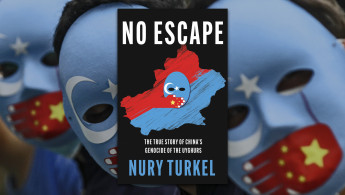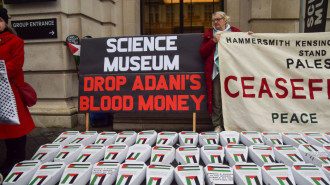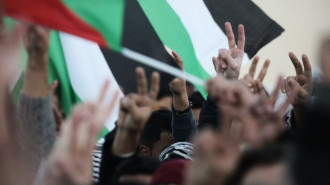No Escape: A gut-wrenching account of China's purge, persecution and genocide of the Uyghur people
How did she want to die? Firing squad, lethal injection or the noose?
Mihrigul Tursun was issued with an orange uniform, the colour of a death row inmate, and told she would be executed within the month. She should choose carefully because each bullet would cost her parents $100 a piece.
Camp survivor Mihrigul's testimony is just one of the many harrowing tales woven into the autobiography of Uyghur-American attorney, Nury Turkel, whose inauspicious birth fifty-two years ago in a Chinese Cultural Revolution labour camp set the course of his life unwittingly on a trajectory which would see him rise to become one of Time Magazine's 100 most influential men.
"[Turkel] challenges the world to make sense of what the New Statesman has described as perhaps the "largest mass incarceration since the Holocaust" and warns of a future in which an unbridled and ambitious China's lack of accountability remains unchecked on the world stage"
The horrifying memoir, No Escape, The True Story of China's Genocide of the Uyghurs, traces the author's tortured beginnings from the time his 19-year-old mother, five months pregnant with her first child was sent away as punishment for her "intoxication with separatist ideology."
For five months after his birth between flag raising at dawn and singing songs in praise of Mao, the young mother would cry in pain trying to give her severely malnourished child the milk she never had.
Some fifty years have passed since the Mao purges ended, but Turkel paints an equally bleak picture of life today for his people under Xi Jinping.
Far from being just another account of the already well-documented atrocities taking place in the Uyghur heartland, his book delves deeply into the historical and socio-political context of East Turkestan (the Uyghur exiles' preferred title for Xinjiang) and the Turkic peoples who have laid claim to it since time immemorial.
He challenges the world to make sense of what the New Statesman has described as perhaps the "largest mass incarceration since the Holocaust" and warns of a future in which an unbridled and ambitious China's lack of accountability remains unchecked on the world stage.
Authentic stories of ordinary Uyghurs caught up in the sweeping purges and mass atrocities across the region, bring vivid colour to the evidence gleaned meticulously by Adrian Zenz, Shawn Zhang, and scores of academics around the world. No Escape paints a broad and shocking picture of the events in Xinjiang that Beijing from the word "go" has vehemently denied.
A short-lived renaissance enjoyed by his people in the 1980s where culture and religion were allowed to flourish, came to an abrupt halt following the collapse of Soviet rule in Eastern Europe, the fall of the Berlin Wall and the subsequent crackdown and slaughter of unarmed Chinese students in China's Tiananmen Square in 1989.
At 25, Turkel decided it was too dangerous to stay and started the process of trying to reach the States to continue his education. In 1995 he bade what turned out to be a final farewell to China.
His decision to eventually apply for asylum in 1997 following a further massacre of Uyghur students in his father's home town of Ghulja, proved to be a major turning point in his life when he resolved to become a human rights lawyer.
"These Uyghurs die hard, don’t they? Just like when you pour boiling water on lice they refuse to die"
Turkel's life since leaving his homeland has been inextricably bound up with the suffering of his people. Sleepless nights, thoughts plagued with the whereabouts of his family, the health of his ageing parents and outrage at the corralling of at least a million of his compatriots into so-called "re-education camps" trouble him relentlessly.
Helpless, he has monitored the roundups from a distance. He has witnessed thousands of mosques vanish from Google Earth and the construction of hundreds of camps and forced labour factories from satellite images.
As the telephone lines have gone silent, and friends in the homeland deleted him from social media, he observed as his land became a vast open prison. Police stations, checkpoints and surveillance cameras have appeared in their tens of thousands to monitor phones, facial expressions, irises, a person's gait, and the day-to-day comings and goings of all those still at large.
|
Reports of compulsory health checks deeply disturbed him, biometric testing and the potential for sexual abuse during the monitoring of every Uyghur home with an unbridled army of so-called Han Chinese "relatives" billeted to spy on their every move unnerved him as he thought of his mother.
As he pieced together the clampdowns, the disappearances and the incremental erosion of Uyghur culture, religion and traditional life, Turkel became inconsolable, but meeting camp survivors in person was a shock for which he was unprepared.
The slow trickle of former detainees, mainly Kazakhs and Uzbeks confirmed everything the academics had gleaned. But there was more. These eyewitnesses who had experienced brutality first-hand, the torture, the senseless deaths and the privations of day-to-day life in the camps, away from the manipulated glare of western media were broken almost beyond repair.
"These Uyghurs die hard, don’t they? Just like when you pour boiling water on lice they refuse to die."
Qelbinur Sedik overheard these words after class, spoken to provoke and test her reaction. She managed to stay calm. As a Chinese teacher, she had been drafted in to teach Mandarin to a roomful of bedraggled elderly farmers in shackles. Her heart broke every day.
Days were full of fetid classrooms from which young girls were removed to be abused, and evenings after work, fending off the lecherous advances of a Chinese official assigned to her home, whom she dared not challenge.
Sayragul Sauytbay and 200 other inmates were forced to witness unflinchingly the gang rape of a young girl in its most brutal form to prove the success of CCP brainwashing methods, and the new mother of triplets, Mihrigul Tursun was abducted, cuffed, hooded and strapped into an immobilising "Tiger Chair" before days of gratuitous beatings, electric shocks and interrogation. When she was released two months later one of her babies was returned to her dead.
"While the cruelties and humiliations in the camps continued unabated, other terrors were unleashed outside. Round-ups, constant checks, disappearances and random arrests were par for the course"
Life in the camps was brutal. The eyewitness accounts make grim reading but add weight to the proofs that prompted first America and then other countries to designate the atrocities as genocide.
Mystery injections and white pills, starvation rations, vermin, shaved heads and beards, numbers not names, hysterical screaming throughout the nights as inmates one after the other were taken for interrogation. Full body scans, blood and tissue typing, DNA profiling and the spectre that at any minute they could be killed and their organs sold on to the highest bidders, were their constant companions.
Zumrat Dawut, Mihrigul and Qelbinur, together with many women between 18-50 were forcibly sterilised, and Uyghur women were hailed no longer "baby-making machines."
Plummeting birth rates in Southern Xinjiang by as much as 84 percent, lent weight to conclusions by the Uyghur Tribunal in London that Beijing's intention was to destroy the Uyghur population altogether and that a genocide was taking place.
|
While the cruelties and humiliations in the camps continued unabated, other terrors were unleashed outside. Round-ups, constant checks, disappearances and random arrests were par for the course. Academics disappeared, their works were banned, religious leaders were given draconian prison sentences and their flock was monitored mercilessly.
Shrines were bulldozed, ancient sites turned into pleasure grounds and burial grounds razed for car parks. The Uyghur language was banned, children whose parents had been detained were adopted by the State and brought up in Han-run orphanages, and hundreds of thousands have done their time in "re-education" and graduated to compulsory labour making goods for western markets throughout the country.
When thirteen tons of human hair products from China were impounded at the US border the crisis spilt over into the conscience of the world. Beijing's secrets started to unravel. CCP documents in their thousands were leaked by whistleblowers, naming names and quoting speeches. Xi's master plan to subdue an entire race was exposed for the world to see.
Turkel recounts his efforts to lay bare the affront of Uyghur forced labour to America and the democratic world, resulting recently in the implementation of the Uyghur Forced Labour Prevention Act, which assumes every product originating from Xinjiang is tainted with forced labour unless proved otherwise. Other governments are cautiously following suit.
He has some salutary conclusions not only for the sake of his own people but for the future of humanity as we know it. Xinjiang, Tibet and Hong Kong, he warns are being used as a testing ground for "dystopian visions."
Xi Jinping's altogether different moral compass urged the world last year to "abandon ideological prejudice" and pursue "win-win co-operation". An absence of shared ethical boundaries with the West, and his determination to overtake the US in hi-tech, concerns Turkel who fears for the future of mankind where Beijing gains the upper hand.
Beijing has muzzled dissent at home and has silenced critics abroad, many of whom are deeply in debt to the superpower. Through exporting its technology, together with its moral impunity around the world, even Europe is buying into and unquestioningly accepting the invasions of privacy that come with AI scrutiny.
No Escape, whilst being the story of one man's journey on behalf of his own people, carries with it a salutary warning for readers who might wonder what the persecution of a people group whose name until a few years ago tripped with difficulty off the tongue, had to do with them. As Turkel intimates, it has everything to do with us all.
The author is writing under a pseudonym to protect her identity

![Author of No Escape, Mihrigul Tursun [photo credit: World Uyghur Congress]](/sites/default/files/styles/medium_16_9/public/2022-08/Untitled_0.png?h=d1cb525d&itok=7DseXhx8)


